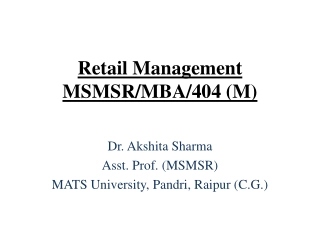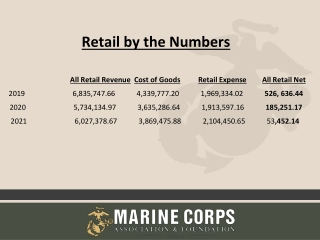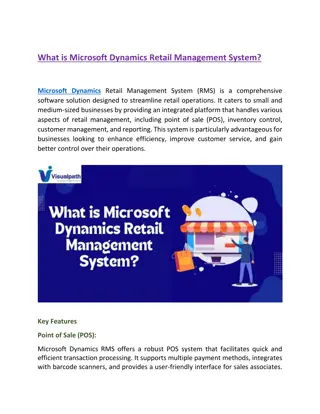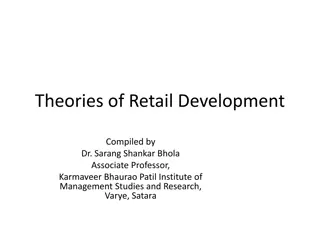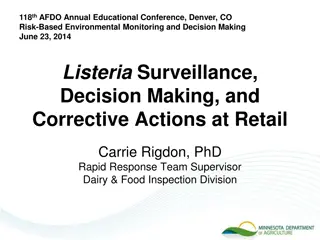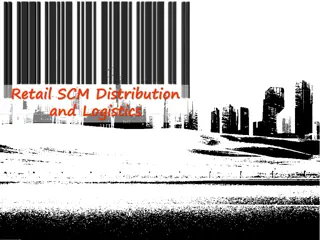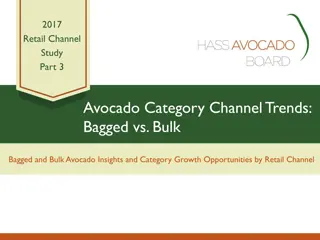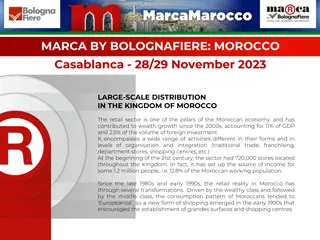Challenges and Findings in the Retail Grocery Sector
Draft findings from the Commerce Commission highlight competition issues in the retail grocery sector in New Zealand. Major retailers dominate, hindering competition and innovation, impacting suppliers and consumer choice. The study reveals high grocery prices, limited innovation, and challenges faced by suppliers due to reliance on major retailers pushing costs onto them.
Download Presentation

Please find below an Image/Link to download the presentation.
The content on the website is provided AS IS for your information and personal use only. It may not be sold, licensed, or shared on other websites without obtaining consent from the author.If you encounter any issues during the download, it is possible that the publisher has removed the file from their server.
You are allowed to download the files provided on this website for personal or commercial use, subject to the condition that they are used lawfully. All files are the property of their respective owners.
The content on the website is provided AS IS for your information and personal use only. It may not be sold, licensed, or shared on other websites without obtaining consent from the author.
E N D
Presentation Transcript
Creating & Sharing Value Katherine Rich Chief Executive NZ Food and Grocery Council Mike Chapman Horticulture New Zealand
Outline Overview of Commerce Commission Draft Market study into the retail grocery sector Mike Rationale and content for Code of Conduct Katherine Allowing suppliers to collectively bargain Mike Fair play for fair reward joint Creating value in the Supply Chain dynamic joint Issues, questions and discussion MC
Retail Grocery Market Study Draft Findings Competition in retail grocery sector not working well for consumers If competition was more effective: retailers would face stronger pressure to deliver the right prices, quality and range Market observations: NZ grocery prices appear high by international standards The two major grocery retailers have persistently high profits The level of innovation in the sector is modest by international standards MC
Competition issues Draft Findings Competition for a consumer s main shop is dominated by two major retailers: Foodstuffs and Woolworths NZ Diverse fringe of other retailers: unable to compete on price & product range to satisfy consumers: main shop at single store Competitors significant challenges including: A lack of competitively priced wholesale supply A lack of suitable sites for store development Major grocery retailers: avoid strongly competing with each other on price and generally do not have lower prices MC
Issues facing suppliers: Draft Findings Competition in the wholesale purchasing of groceries is not working well for many suppliers Many suppliers are reliant on the two major grocery retailers This allows the major grocery retailers to push excess costs, risks and uncertainty onto suppliers with fears of delisting if they do not agree to their terms This can reduce the ability and incentive for suppliers to invest and innovate, reducing choice for consumers KR
Detailed Commissions Findings on Suppliers What the Commerce Commission found: Grocery retailers using their strong negotiating position to limit suppliers ability or incentive to provide competitive supply terms to other retailers Grocery retailers transfer costs and risks to suppliers, despite retailers being better placed to manage them - may reduce efficiency, resulting in higher costs to consumers Grocery retailers reduce transparency and certainty over terms of supply. This harms suppliers ability to innovate and invest, reducing consumer choice in the longer term KR
What are some solutions & Why a Code? Structural and market issues, but also about behaviour and culture A suite of regulatory changes are required Commerce Act, Fair Trading Act, Mandatory Grocery Code of Conduct for Supermarkets A code changes everyday processes and will make supermarket and supplier relationships more transparent Needs to be mandatory KR
What could be covered by a Code? Fair contracts in writing and signed by both parties No coercive behaviour, bullying, cliffing etc Fairer, faster payment terms, particularly for fresh product with high turnover Intellectual property protections Reasonable price increase processes Clear processes for category reviews, deletions, credit Payments for genuine services not ad hoc % deductions No expected investment in store wages accounts No payments for shelf space No third party forcing for data, transport or other services No retrospective payments or deductions without consent Independent dispute and appeal processes Pass through of promotions to consumers to reduce to margin fattening Etc, etc, etc KR
Code of Conduct Content from Commission set minimum standards for the setting and variation of terms of supply between major grocery retailers and suppliers must be: recorded in writing written in clear and concise language quantity and quality standards delivery requirements when groceries may be rejected the maximum period for payment circumstances when payment may be withheld, or deductions made limits on retrospective variations of the terms of supply limits on unilateral variations of the terms of supply KR
Code of Conduct Properly functioning Horticulture Code is vital in ensuring the sustained viability of Australia s horticulture sector one that improves the clarity and transparency Recommendations Aussie Hort Code Review November 2015: Standard form produce agreement Obligation to act in good faith Method or formula for grower payments Communication and education KR
Allowing suppliers to collectively bargain Commission said: Another method of addressing any power imbalance would be the introduction of collective bargaining on behalf of suppliers May require an exemption from the Commerce Act domestic application only The Australian Competition and Consumer Commission has recently introduced: a class exemption in respect of collective bargaining by small firms permitting collective bargaining by firms with a collective annual turnover of less than $10 million MC
Commission on Collective Bargaining Collective bargaining by small suppliers could be authorised, or provided a statutory exception, on a class basis. Any such authorisation or exception would need to ensure: a maximum size for any business involved in collective bargaining. the collective bargaining did not permit, or facilitate, additional conduct that would be likely to harm competition transparent when collective bargaining was occurring, so it could be monitored tailored to circumstances as they arise Collective bargaining by suppliers may not be sufficient, on its own, to overcome a significant imbalance between suppliers and major grocery retailers MC
Commissions Supplier Recommendations NZ is small market challenged by geographical separation Is the duopoly a fact of NZ life? Will a code of conduct or limited collective bargaining change the market circumstances? NZ consumer and Stats NZ full transparency may achieve much more: give knowledge and then power to consumers to be the real market regulator MC
Fair Play for Fair Reward, a flourishing and sustainable food industry. Food security for food supply: In New Zealand New Zealand s Pacific Mandate Growth dynamic: Land, water, labour, technology, varieties, biosecurity Return to the grower Consumer pricing Competitive effects: On-line, direct deliveries, independents Supermarket code of conduct? Transparency Creating value in the supply chain KR & MC
Creating Value in the Supply Chain Dynamic New Zealand Horticulture s points of difference: 1. Healthy food 2. Tiny environmental footprint 3. Sustaining rural communities 4. Provenance Challenge: how to get consumers to recognise these four factors and pay for it? KR & MC


